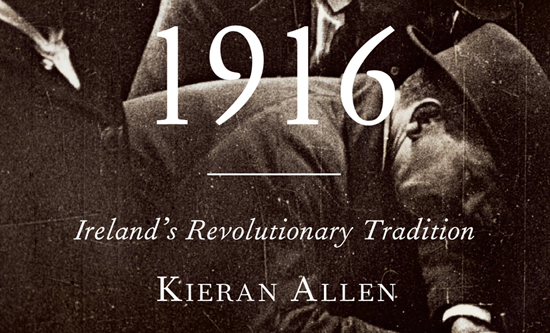
1916 – Ireland’s revolutionary tradition
Kieran Allen, Pluto Press 2016, 222pp, £12.99
This book, by a leading member of the Socialist Workers Party in the 26 Counties, is a completely dishonest account of Irish revolutionary struggles since the 19th century. Dishonest, because the purpose in writing it is never made explicit. Worse, in that the author, a self-proclaimed Marxist, does not mention let alone analyse any of Marx’s and Engel’s copious writings on Ireland. He therefore avoids the need to assess the classic standpoint on the revolutionary significance of the struggle by oppressed nations for national liberation. Indeed, reading the book, one would not know that either of the founders of Marxism had ever written a single word on Ireland, let alone led a struggle within the British working class in support of Irish revolutionaries in prison.
The book’s purpose is essentially two-fold. First, to justify the opposition of petit bourgeois socialists in Ireland to the national liberation struggle led by the Provisional Republican movement. Second, to imply that partition and the existence of the Six Counties statelet are no longer political issues, and that struggles both north and south of the border can and must proceed independently of each other, and on issues that do not raise the national question.
Even if he does not cite it, Allen follows Trotsky’s view that the defeat of the 1916 Rising showed that ‘The basis for national revolution has disappeared even in backward Ireland… The experiment of an Irish rebellion… is over.’ Allen does this indirectly by making the preposterous claim that in Labour and Irish history, ‘Connolly advanced his own version of permanent revolution’ which had ‘a remarkable similarity to the ideas advanced by Trotsky in Russia’ (Allen, p51). Preposterous because, in dismissing the significance of the Easter Rising, Trotsky demonstrated that he did not understand the national question and its relation to the working class struggle for socialism – and Connolly did. Not for nothing did Lenin praise Labour and Irish history when he met Connolly’s son in 1920 at the Second Congress of the Comintern – at precisely the time when Lenin was preparing theses on the national and colonial question which were a complete rejection of Trotsky’s standpoint.
Allen uses Lenin in a completely dishonest manner when, in explaining that there are ‘criticisms about the manner in which Connolly joined the rebellion’, he says that ‘Instead of an insurrection arising out of a working class mobilisation, it became a purely military operation whose timing was not linked to a wider upsurge amongst workers. The Rising was also, in this sense, “premature”.’ (p58). This is the only reference to Lenin’s own assessment of the 1916 Uprising and it is deliberately ripped out of context. Lenin indeed says it was ‘premature’, not as a criticism but as a misfortune, and in the same article directly refutes Allen’s argument: ‘So one army lines up in one place and says “We are for socialism” and another, somewhere else and says, “We are for imperialism”, and that will be a social revolution’, continuing ‘Whoever expects a “pure” social revolution will never live to see it. Such a person pays lip-service to revolution without understanding what revolution is.’
As against Lenin’s position in the relation between the national question and social revolution, Allen’s opinion is that ‘nationalist movements have always been Janus-faced – they can look in two directions at once, because loyalty to nation trumps any class interest’ (p150). Yet the question for Lenin and communists is not the legitimacy of nationalist movements of the oppressed, but which class leads them. Allen makes his point in dismissing the explicit turn towards socialism by sections of the Provisionals’ leadership in the late 1970s. He says that this had no substance. Yet earlier he has had to concede that the Provisionals were both working class in membership and had massive popular support (p143). Surely then, the job of socialists and communists was to participate in this movement to strengthen the progressive trend within it, to ensure that the turn towards socialism was irrevocable? Instead, the petit bourgeois socialists of the day (who included Allen) chose to stand aside from the revolutionary working class and oppose its leadership. It was a sectarian and reactionary standpoint which reflected their determination to put their privileged position in society before any participation in the liberation struggle.
For all his wittering about the need for mass working class participation in the struggle, Allen finds no room to even mention the Relatives Action Committees (RACs) which came to the fore in the 1978-79 period. Led by working class women in the Six Counties, the committees mobilised thousands of nationalists on the streets in support of political prisoners. In contrast to the petit bourgeois socialists, their support for the armed struggle was unashamed.
Nowadays, Allen is much happier with the political prospects that face him and his trend. He can speculate about the possibilities of ‘a left government in Ireland’ which ‘would indeed be a marvellous sight’ (p182). Just to make it clear, his ‘Ireland’ is just the 26 Counties. This ‘left’ government would do all sorts of things: confront the wealthy, the global corporations, the EU. What it won’t apparently do is confront partition. For Allen, such a step is clearly unnecessary, since on the other side of the border, his colleague Eamonn McCann is doing very nicely thank you, taking up his seat in Stormont as a representative of People before Profit. Partition has been airbrushed out of politics: the carnival of reaction which Connolly spoke of now masquerades as a carnival of progress.
Robert Clough
Fight Racism! Fight Imperialism! 251 June/July 2016




